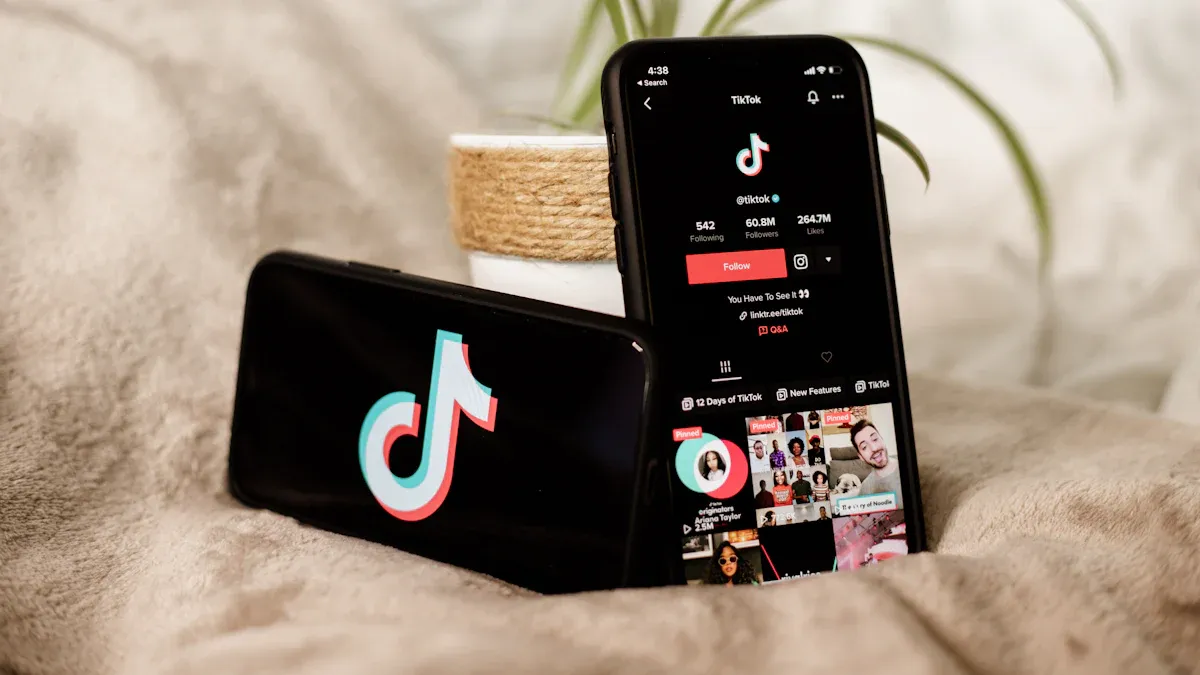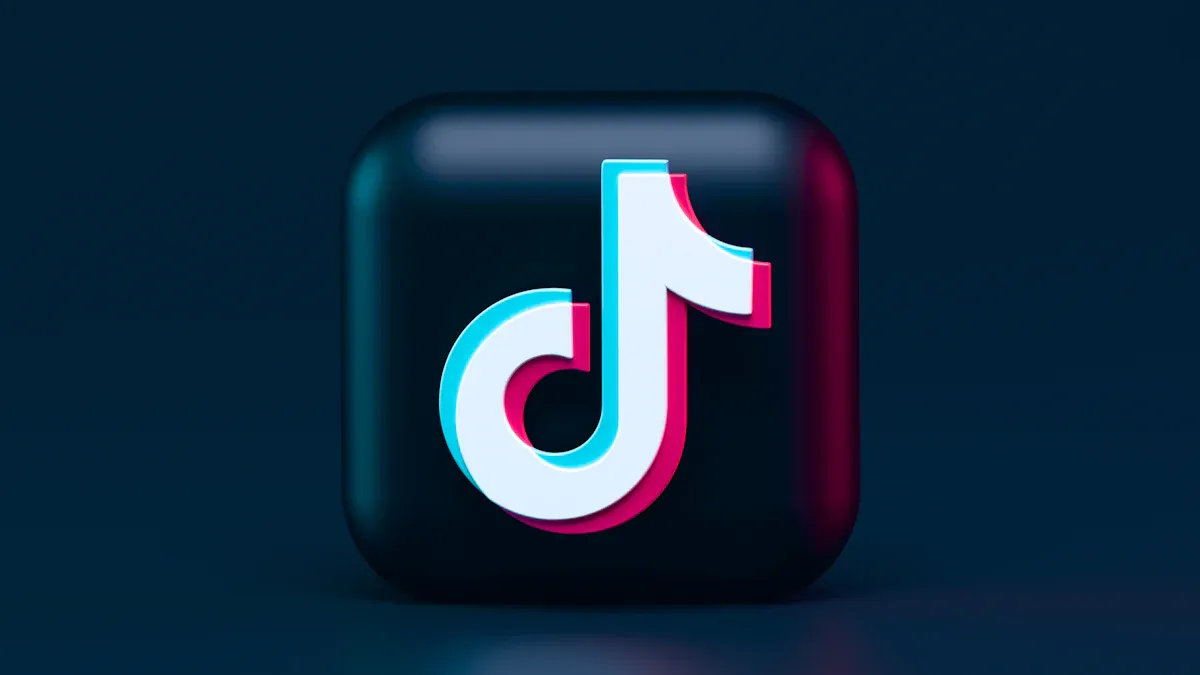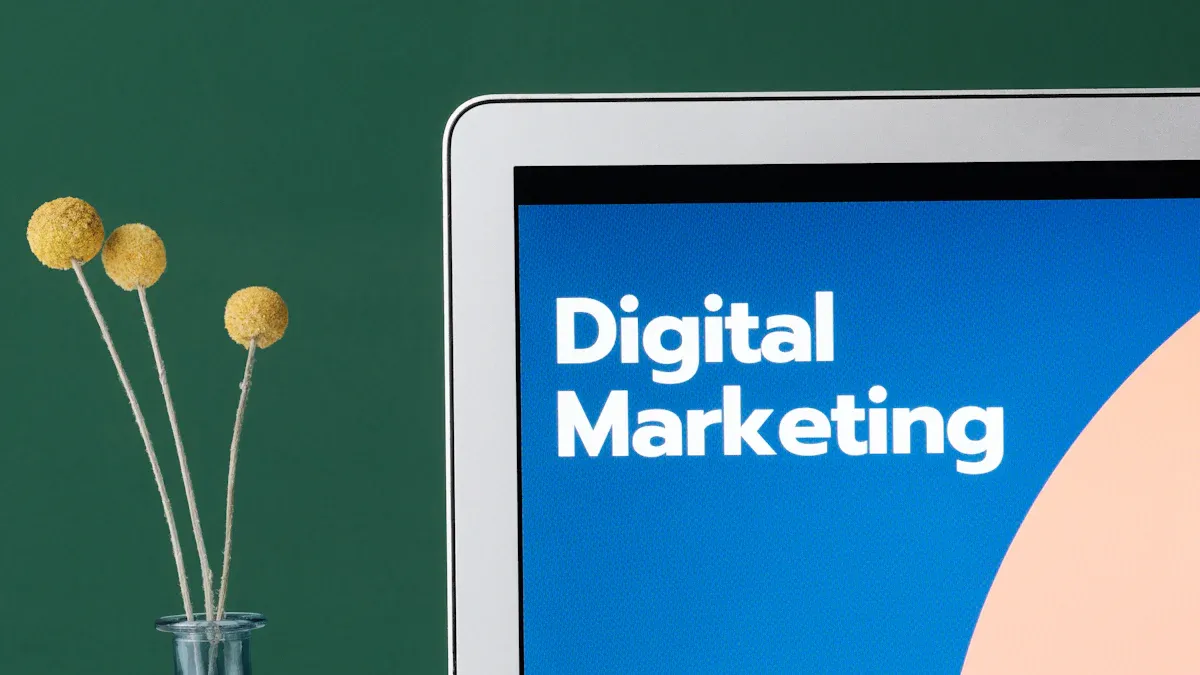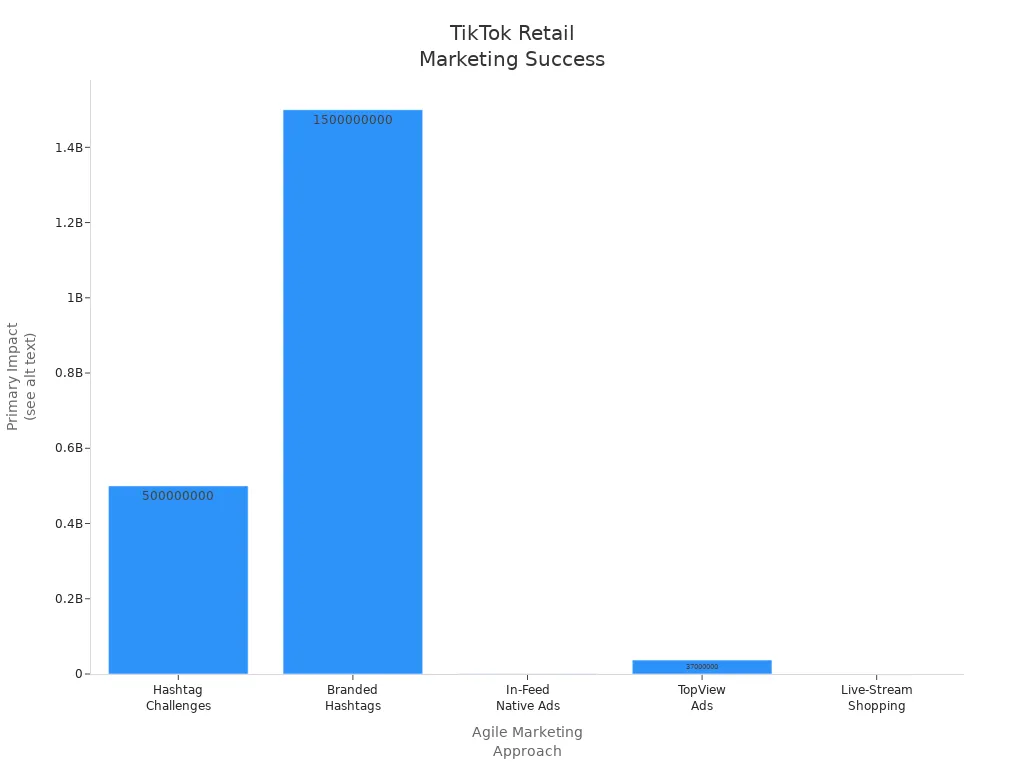TikTok Marketing and what retailers overlook in digital transformation

TikTok Marketing has redefined how retailers approach digital transformation. With over 1 billion active users worldwide, TikTok Shop lets brands connect with shoppers through seamless, in-app purchases and influencer-driven content. Features like shoppertainment and the halo effect often go unnoticed, yet they deliver real results. For example, brands have seen up to 40% higher Return on Ad Spend during Mega Sale Days and dramatic lifts in brand awareness and preference. Retailers who use TikTok Marketing tap into new audiences, spark spontaneous buying, and achieve measurable sales growth.
Key Takeaways
TikTok Shop offers powerful tools like live shopping and shoppable videos that help retailers reach more customers and boost sales quickly.
Creating fun and engaging content, called shoppertainment, encourages shoppers to buy on impulse and builds strong brand loyalty.
Partnering with the right influencers and allowing creative freedom leads to authentic content that connects with target audiences and drives conversions.
Using AI and advanced ad formats helps personalize marketing, making ads more effective and improving return on investment.
Measuring campaign performance with TikTok’s analytics and multi-touch attribution gives retailers clear insights to optimize strategies and grow sales.
TikTok Marketing Features

Shopping Tools
Retailers now have access to a powerful set of shopping tools on TikTok. These tools help brands connect with shoppers in new ways and drive real sales.
LIVE Shopping lets brands host live streams where they can showcase products in real time. Shoppers can buy items directly from the stream without leaving the app.
Shoppable Videos appear in users’ feeds as short clips with product links. These videos encourage viewers to make purchases with just a tap.
Product Showcase Tab acts as a digital catalog, allowing brands to display a wide range of products on their profile.
TikTok Shop brings all these features together, creating a seamless in-app shopping experience. The platform uses its algorithm to boost product visibility and sales.
Creator Marketplace and Seller Center make it easy for brands to collaborate with creators and manage their shops.
The checkout process is quick and secure, which increases user convenience and reduces friction.
Retailers benefit from these tools by reaching a broad audience, partnering with creators for authentic content, and positioning products in entertaining videos. For example, a perfume retailer used TikTok Shop’s live streaming and affiliate marketing tools to double sales. Half of the sales came from the retailer’s own live streams, even with a small follower base. The other half came from affiliates, showing that both newcomers and established creators can succeed. Another retailer revived a near-closed TikTok store and generated $8,000 in sales within a month. These cases show how TikTok Marketing tools can quickly boost retail performance.
Tip: Brands should use TikTok Shop to create multiple sales touchpoints, making it easier for shoppers to discover and buy products.
Shoppable Content
Shoppable content on TikTok transforms the way consumers engage with brands. The platform’s unique algorithm, live shopping events, and influencer collaborations create immersive experiences that drive engagement and sales.
Live shopping events allow real-time interaction between brands and consumers, creating excitement and urgency.
User-generated content campaigns, such as #TikTokMadeMeBuyIt, build authenticity and community, encouraging purchases through peer influence.
Influencer partnerships help brands reach niche audiences with relatable product demonstrations.
Shoppable videos and live streams let users shop directly from content, shortening the customer journey and reducing cart abandonment.
Retailers see higher conversion rates because TikTok Marketing combines entertainment with shopping. For example, live-streamed shopping events have shown 15 times more engagement and a 50% increase in customers compared to traditional social posts. A coffee brand increased sales by 25% in one month by telling relatable stories in their videos. A laundry soap brand boosted click-through rates by 35% by joining popular TikTok trends.
Best Practices for High-Performing Shoppable Content:
Create eye-catching videos with bright colors and sharp visuals.
Use storytelling to show how products fit into daily life.
Add trending sounds and formats to increase discoverability.
Place product links clearly and ensure they lead to mobile-friendly pages.
Include clear calls to action, such as “Tap the link to shop now!”
Collaborate with influencers to expand reach.
Join TikTok challenges to showcase products naturally.
Track engagement, click-through, and conversion rates to optimize content.
Shop Integration
Retailers can integrate TikTok Shop with existing e-commerce platforms using Integration Platform as a Service (iPaaS) partners. These platforms, such as Patchworks, offer no-code or low-code solutions with pre-built connectors. They link TikTok Shop to systems like Shopify, Magento, BigCommerce, ERP, OMS, CRM, and marketing platforms. When a customer places an order on TikTok Shop, the integration updates all business systems in real time. This automation streamlines order placement and fulfillment, reduces manual work, and ensures smooth data flow.
Shop integration allows retailers to synchronize TikTok Shop with their current infrastructure. This approach improves operational efficiency and helps brands capitalize on TikTok’s social commerce strengths.
Note: Automated integration supports scalability and provides real-time data insights, making it easier for retailers to make informed decisions.
Shoppertainment: The Secret to Engagement
Shoppertainment combines entertainment with shopping, making the experience fun and engaging. TikTok Marketing uses short-form videos, creator stories, and viral trends to turn shopping into an enjoyable activity. According to a TikTok study, 89% of consumers made unplanned purchases after watching shoppertainment videos. One in three shoppers wants more entertaining shopping experiences.
Description | Influence on Shoppers | |
|---|---|---|
Persona | Identifies different consumer types and tailors content to their needs. | Helps shoppers find products that match their preferences. |
Assortment | Offers a mix of popular and niche products, including exclusives. | Appeals to value-focused and trend-driven shoppers, encouraging more purchases. |
Content | Uses TikTok-native content strategies like recut, remix, and reimagine. | Makes shopping entertaining and relatable, driving impulse buys. |
Empowerment | Ensures efficient operations and fresh content. | Keeps shoppers engaged and loyal with ongoing, relevant experiences. |
Shoppertainment appeals to both value-focused and trend-driven shoppers. Value-focused shoppers enjoy educational content that helps them make smart choices. Trend-driven shoppers love dynamic videos that highlight the latest styles and products. TikTok Marketing leverages these preferences to boost engagement, drive unplanned purchases, and build brand loyalty.
Real-World Campaigns
Brand | Campaign Description | Influencer | Key Success Factors |
|---|---|---|---|
H&M | Collaboration with @jacksondean using 'Get Ready With Me' (#GRWM) format to promote sportswear collection | @jacksondean | Voiceover for clarity, product functionality, engaging hashtag #GRWM |
COS | Partnered with @leoniehanne for authentic product showcases via photoshoot-style ads | @leoniehanne | Authentic presentation, good editing merging photos and videos |
Nike | Minimalist product-focused ads highlighting shoe comfort and softness | N/A | Clean background, subtle brand motto, focus on product features |
Net-A-Porter | Creative influencer collaboration with @reganmia showcasing clothing in unique combinations | @reganmia | Tailored content, excellent lighting, viral audio, clean editing |
These campaigns show how TikTok Marketing helps brands reach new audiences, showcase products in creative ways, and drive measurable results.
Creator Partnerships

Influencer Strategies
Retailers on TikTok achieve success by choosing the right influencer strategy. Brands often categorize influencers by follower count and audience niche. Mega-influencers offer maximum exposure, but their reach can be broad and less targeted. Macro-influencers balance reach and niche relevance. Micro-influencers provide budget-friendly options and connect with specific communities. Nano-influencers have small but highly engaged audiences, making them cost-effective and authentic.
Brands define clear campaign objectives, such as boosting sales or increasing visibility.
They select influencers who align with brand values and target audience.
Creative freedom remains important. Influencers produce authentic content that resonates with their followers.
Brands set clear agreements on deliverables and timelines.
Teams monitor campaign performance using metrics like engagement and conversions.
Retailers see strong results when they focus on relevance and engagement, not just follower count. For example, Mazda partnered with a lesser-known influencer and achieved top sales impact. Charli D’Amelio’s collaboration with Takis led to massive engagement because her personality matched the brand.
Tip: Long-term partnerships with influencers build trust and keep campaigns fresh.
Real-Time Collaboration
Real-time collaboration between brands and creators drives campaign performance on TikTok. Influencers understand platform culture and trends. They create native content that feels organic, not forced. Live sessions, surprise takeovers, and interactive challenges encourage audience participation.
Influencers who showcase products in real time build trust with viewers. For example, Mikayla Nogueira’s beauty reviews led to a 76% sales increase for brands like L'Oréal. Khaby Lame’s unique style generated millions of impressions for Binance in just two days. Brands that allow creative freedom and open communication see higher engagement and conversions.
Community Campaigns
Community campaigns help retailers build loyal audiences on TikTok. Brands use live streams to answer questions and showcase products. Interactive content, such as polls and challenges, fosters two-way communication.
Explanation | |
|---|---|
Relevance | Aligns content with brand identity and audience. |
Valuable | Offers useful or entertaining content. |
Entertaining | Captures attention with humor and visuals. |
Unique | Stands out with creative ideas. |
Editing | Uses high-quality editing for clarity. |
Retailers who engage with TikTok communities, like #BookTok, see higher trust and participation. Consistent, interactive content builds brand loyalty and keeps audiences coming back.
Advanced Ads & AI
Interactive Formats
TikTok offers a wide range of advanced ad formats that help retailers capture attention and drive results. Each format serves a unique purpose, from boosting brand visibility to encouraging direct purchases. The table below highlights key ad formats and their benefits for retail marketing:
TikTok Ad Format | Key Features and Benefits |
|---|---|
Collection Ads | Showcases products in-feed; enables seamless discovery and purchase; increases conversion rates. |
Dynamic Showcase Ads (DSA) | Delivers personalized recommendations; automates large catalog promotion; updates product info dynamically. |
Lead Generation Ads | Captures leads within TikTok; uses customizable forms; integrates with CRM systems. |
Pangle Ads | Extends reach to other mobile apps; offers diverse formats and targeting; tracks performance. |
TopView Ads | Premium placement when users open the app; ensures high visibility for major launches. |
Brand Takeover Ads | Maximizes brand exposure by owning the screen immediately. |
Branded Hashtag Challenges | Drives viral engagement; encourages user content creation around brand themes. |
Branded Effects | Adds custom filters, lenses, and stickers; boosts creativity and interactivity. |
In-Feed Ads | Integrates ads into user feeds; supports engagement and product-focused campaigns. |
Retailers can mix these formats to match campaign goals. For example, branded hashtag challenges spark community participation, while collection ads drive direct sales.
AI Personalization
Artificial intelligence on TikTok transforms how retailers reach and engage shoppers. AI tools analyze user data to deliver the right message at the right time. Retailers benefit from:
Modular video ads that adapt scenes to viewer preferences or location.
AI-assisted design tools that create multiple visual variations for different audiences.
Personalized audio content that matches user mood or engagement history.
Consistent messaging across email, websites, and social media.
Real-time data sync between CRM, analytics, and content delivery tools.
Interactive features like live streams with personalized offers.
A balance between AI automation and creative control to keep brand voice authentic.
TikTok’s recommendation engine uses demographics, interests, and behavior to target ads precisely. Retailers who personalize content see higher engagement and better ad spend efficiency.
Dynamic Product Ads
Dynamic product ads help retailers automate and scale their marketing on TikTok. These ads pull from product catalogs and update in real time. When a user shows interest in a product, TikTok’s system displays relevant ads with up-to-date information. This approach reduces manual work and ensures shoppers see the most relevant offers.
Retailers can segment audiences and tailor ad styles, such as storytelling or humor, to fit each group. Continuous testing and optimization improve performance. Dynamic product ads foster emotional connections and drive higher conversion rates, making them a key tool for digital transformation on TikTok.
Measurement & Attribution
Analytics Tools
Retailers need clear insights to measure the impact of their TikTok campaigns. TikTok provides a suite of analytics tools that help brands track performance and make data-driven decisions. These tools offer real-time feedback and highlight what works best for each campaign.
Analytics Feature | Description |
|---|---|
Sales Performance Metrics | Track total sales, order volume, and average order value to evaluate overall shop performance. |
Product Performance Analysis | Identify best-selling products and those needing attention for inventory and marketing decisions. |
Customer Behavior Tracking | Monitor click-through and conversion rates to understand customer engagement and purchase patterns. |
Content Engagement Metrics | Measure video views, likes, comments, shares, and saves to assess content effectiveness. |
Follower Insights | Obtain demographic data such as age, gender, and location to tailor marketing strategies. |
Live Shopping Analytics | Access real-time data during live streams including viewer counts, sales, and click-through rates. |
These analytics features allow retailers to spot trends, adjust strategies, and improve results quickly. Brands can see which products perform best and which videos drive the most engagement.
Multi-Touch Models
Multi-touch attribution models help retailers understand the full customer journey. Instead of giving all credit to a single ad or channel, these models assign value to every touchpoint a shopper interacts with before making a purchase. This approach captures the real path customers take, which often includes several platforms and interactions.
Multi-touch attribution shows how TikTok, along with other channels, influences conversions.
It reflects the non-linear journey where shoppers move between Google, Instagram, TikTok, and more.
AI-powered models use machine learning to find which touchpoints matter most.
Marketers can choose from different models like linear, time decay, U-shaped, or W-shaped to fit their needs.
This method gives a clearer picture than single-touch models, helping brands see TikTok’s true impact and spend budgets wisely.
For example, SugarGang, a German DTC brand, used multi-touch attribution to combine TikTok data with other channels. By using server-side tracking, they gained accurate insights and tripled their return on ad spend.
Online-Offline Data
Retailers often struggle to connect online marketing with offline sales. AI-powered decision intelligence platforms, such as Kleene, help solve this challenge. These platforms integrate TikTok data through APIs and combine it with other business data sources. Brands can then measure the true impact of TikTok campaigns on both online and offline results.
This unified view breaks down data silos and helps retailers predict how changes in marketing budgets affect real-world outcomes. By linking TikTok analytics with offline business metrics, brands gain a complete understanding of their marketing performance and can make smarter decisions for future campaigns.
Innovation & Learning
Trend Monitoring
Retailers who excel on TikTok make trend monitoring a daily habit. They use a mix of manual exploration and digital tools to stay ahead.
Explore TikTok’s discovery page to spot trending sounds, hashtags, and challenges in retail.
Use trend prediction tools like TrendTok, TikTok analytics, and Google Trends to anticipate what’s next.
Track popular hashtags and challenges through TikTok’s search and social listening features.
Follow top creators and influencers to see new trends early and learn how to adapt them.
Engage with the TikTok community by commenting, joining challenges, and interacting with users.
Launch branded challenges and encourage user-generated content to boost engagement.
Collaborate with influencers who align with the brand to amplify reach.
Adapt trending formats and sounds to fit brand messaging and goals.
Post consistently and experiment with different video formats to find what works best.
Focus on authentic storytelling instead of over-promotion to build trust.
Use TikTok analytics to measure performance and refine strategies.
Tip: Integrating AI tools like TikTok Symphony Assistant helps teams access real-time trend data and ideate content quickly.
Team Training
Retail teams need ongoing training to keep up with TikTok’s evolving features.
Digital literacy and social media proficiency help teams create and manage content.
Skills in graphic design, photography, videography, and copywriting enable the production of compelling videos.
Data analysis training allows teams to interpret consumer behavior and optimize strategies.
Customer engagement training improves direct interaction and builds loyalty.
Regular workshops and development sessions ensure teams stay updated on new TikTok tools and best practices.
Teams that invest in continuous learning adapt faster and deliver better results.
Experimentation
Agile marketing thrives on experimentation. Retailers test new ideas, measure results, and scale what works. The table below highlights successful agile marketing approaches on TikTok:
Agile Marketing Approach | Brand Example | Outcome / Impact |
|---|---|---|
Hashtag Challenges | Chipotle (#GuacDance) | |
Branded Hashtags | E.l.f. Cosmetics (#EyesLipsFace) | 1.5B views, 5M user videos in 2 weeks |
In-Feed Native Ads | Gymshark | 500K likes, high website traffic |
TopView Ads | Disney+ (Loki launch) | 37M users reached in one day |
Live-Stream Shopping Events | Black Friday campaigns | 300% uplift in purchases, 400% increase in product searches |

Retailers benefit from continuous experimentation by leveraging user-generated content, collaborating with influencers, and launching viral challenges. This approach fosters creativity, builds community, and drives measurable growth.
Retailers often overlook key TikTok Marketing opportunities that drive real results.
Opportunity | Impact |
|---|---|
Native Shopping Tools | |
Creator Partnerships | Doubled conversion rates, 12B+ hashtag views |
Shoppable Content | 25% sales increase, 81% repeat sales |
Data Integration | Offline sales spikes, full campaign impact |
5:1 ROI, better budget use |
Integrating these features supports digital transformation by boosting engagement, sales, and loyalty. Retailers should act now, experiment with new formats, and measure performance to stay ahead in a fast-changing market.
Ongoing innovation and regular measurement help brands maximize TikTok’s potential and achieve long-term growth.
FAQ
What is TikTok Shop and how does it help retailers?
TikTok Shop allows brands to sell products directly within the TikTok app. Retailers can reach new customers, boost sales, and create a seamless shopping experience without sending users to another website.
How can retailers measure TikTok campaign success?
Retailers use TikTok’s analytics tools to track sales, engagement, and customer behavior. These tools provide real-time data, helping brands see what works and adjust strategies for better results.
Why do creator partnerships matter on TikTok?
Creator partnerships help brands connect with target audiences. Influencers build trust and drive engagement by sharing authentic content. This approach often leads to higher conversion rates and stronger brand loyalty.
What is shoppertainment and why is it important?
Shoppertainment blends shopping with entertainment. Brands use fun videos, trends, and stories to make shopping enjoyable. This strategy increases impulse buys and keeps shoppers coming back.
Tip: Brands that use shoppertainment see more engagement and higher sales.
See Also
How TikTok’s Content Network Drives Retail Success
Strategies To Convert TikTok Visitors Into Customers
Artificial Intelligence Revolutionizing The Retail Shopping Journey
Real-World Retail Insights On Forecasting Consumer Behavior
Top Five Attribution Approaches For Retail Marketing Budgets

